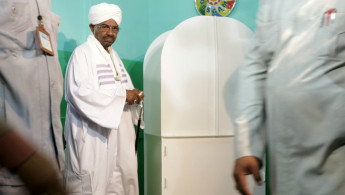Sudan’s long-standing dictator al-Bashir 'moved to Kobar prison in Khartoum'
Sudan's military rulers have transferred long-standing former president Omar al-Bashir to prison, media reports said on Wednesday.
The 75-year-old's whereabouts have been unknown since a military takeover on 11 April, when the country's new rulers said he was being held "in a secure place".
Following the historic end to al-Bashir's three-decade rule, he was moved late on Tuesday "to Kobar prison in Khartoum", a local source said without revealing his name for security reasons.
Nearby witnesses also said there was a heavy deployment of soldiers and members of a paramilitary group outside the prison.
The detention of al-Bashir has failed to pacify protesters, who started anti-government demonstrations in December and have for days been camped out in front of Khartoum's army headquarters.
Officials say at least 65 people have been killed following protest-related violence since December, with some of those killed immortalised in a Khartoum mural.
The country's regime has been shaken by radical and swift changes, sometimes with remarkable concessions to protesters' demands.
Lieutenant General Awad Ibn Auf took the oath to become the head of the council on 12 April, but only to resign one day after amid mass protests calling for a civilian-led transitional administration.
The general was replaced by Lieutenant General Abdel Fattah al-Burhan, who announced a raft of concessions in effort to appease protesters calling for a civilian-led transition.
Burhan vowed on Saturday to "uproot [al-Bashir's] regime", free detained protesters and hold talks with all political parties and groups that took part in the protests.
Amid these escalations and tug of war, Sudan's foreign ministry on Sunday urged the international community to back the country's new military rulers to help "democratic transition".
"The ministry of foreign affairs is looking forward to the international community to understand the situation and to support the transitional military council... in order to achieve the Sudanese goal of democratic transition," the ministry said in a statement.
Saudi Arabia and the UAE have already announced their backing for Sudan's new junta, announcing that they will send aid to Sudan.
Media reports also noted on Tuesday that Russia recognised Sudan's military rulers.
RIA news agency, reported that Russia's deputy foreign minister said Moscow recognised Sudan's transitional military council
When Mikhail Bogdanov was asked whether Russia recognised the new authorities in Sudan and maintained contact with them, he responded in the affirmative.
"Yes, of course," Bogdanov reiterated.





 Follow the Middle East's top stories in English at The New Arab on Google News
Follow the Middle East's top stories in English at The New Arab on Google News

![Israeli forces ordered bombed Gaza's Jabalia, ordering residents to leave [Getty]](/sites/default/files/styles/image_330x185/public/2176418030.jpeg?h=a5f2f23a&itok=_YGZaP1z)
